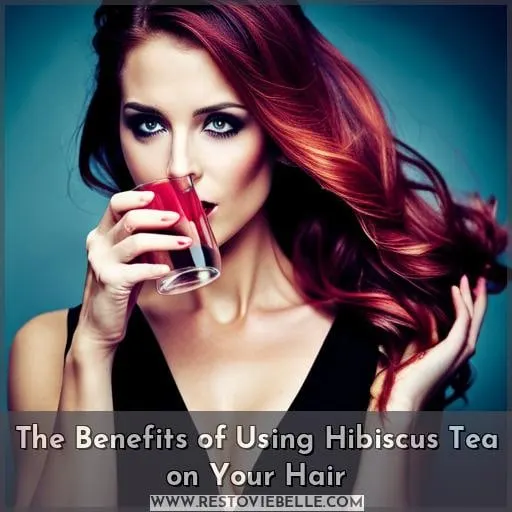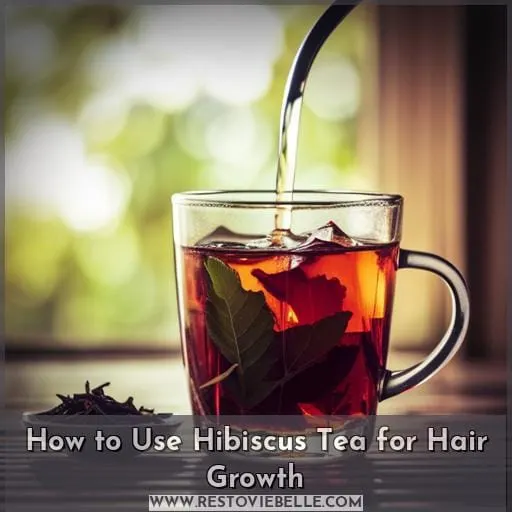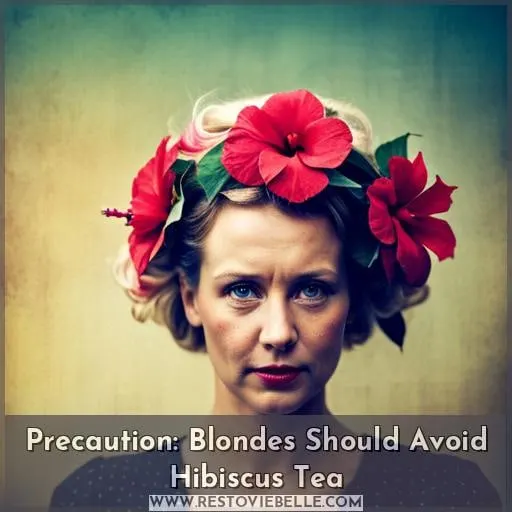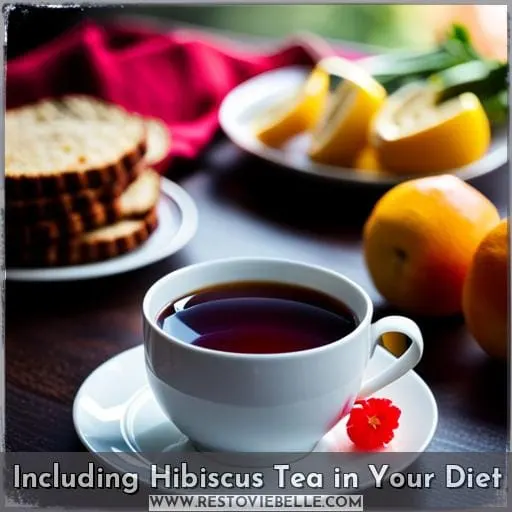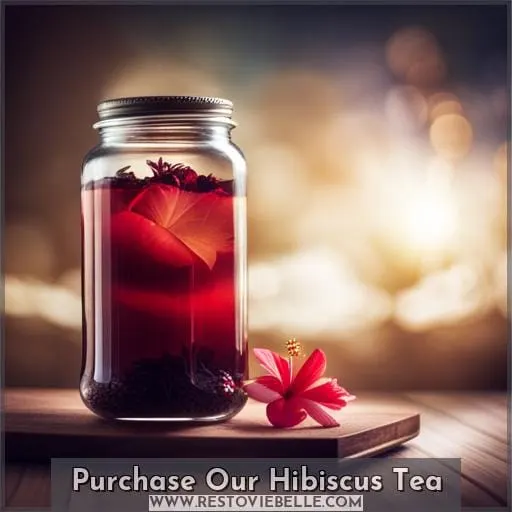This site is supported by our readers. We may earn a commission, at no cost to you, if you purchase through links.
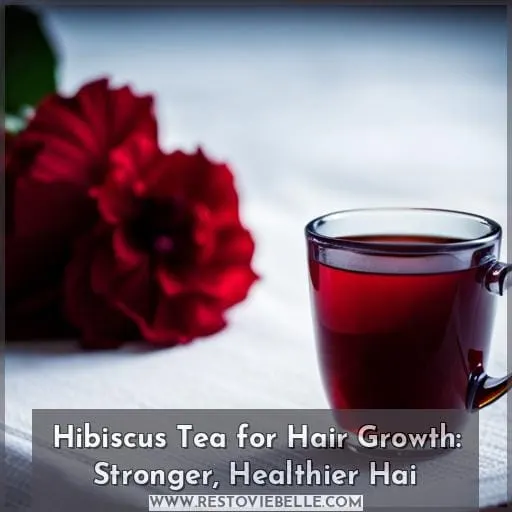 Discover the secret to stronger, healthier hair with hibiscus tea. This powerful herbal remedy has been used for centuries and is known for its ability to stimulate hair growth and prevent dryness.
Discover the secret to stronger, healthier hair with hibiscus tea. This powerful herbal remedy has been used for centuries and is known for its ability to stimulate hair growth and prevent dryness.
The compounds present in hibiscus tea nourish the scalp, strengthen roots, and promote healthy follicles. Scientific research supports these claims, making hibiscus tea a must-try solution for those seeking luscious locks.
Say goodbye to dull and lifeless hair – embrace the power of hibiscus today!
Table Of Contents
- Key Takeaways
- The Benefits of Using Hibiscus Tea on Your Hair
- How to Use Hibiscus Tea for Hair Growth
- Precaution: Blondes Should Avoid Hibiscus Tea
- Including Hibiscus Tea in Your Diet
- Purchase Our Hibiscus Tea
- Frequently Asked Questions (FAQs)
- Can hibiscus tea be used on all hair types?
- Is it safe to use hibiscus tea on colored or chemically treated hair?
- How often should hibiscus tea be used on the hair for maximum benefits?
- Can hibiscus tea cause any allergic reactions or scalp irritation?
- Are there any potential side effects of using hibiscus tea on the hair?
- Conclusion
Key Takeaways
- Stimulates hair growth
- Strengthens roots and prevents dryness
- Treats scalp problems like itching and dandruff
- Improves shine, softens hair, and adds volume
The Benefits of Using Hibiscus Tea on Your Hair
Using hibiscus tea on your hair can provide several benefits.
The rich combination of vitamin C, amino acids, and antioxidants in hibiscus tea stimulates hair growth and strengthens the roots, leading to healthier and stronger hair. Additionally, it helps treat scalp problems such as itching and dandruff by soothing inflammation and providing nourishment to the scalp.
Stimulates Hair Growth
If you’re looking to stimulate hair growth, hibiscus tea can be a beneficial addition to your hair care routine.
Scientific research suggests that hibiscus tea contains compounds like amino acids and vitamin C, which contribute to the promotion of hair growth.
Studies have shown that these components help strengthen and nourish the scalp, leading to healthier follicles and improved hair growth results.
Incorporating hibiscus tea into your regimen may provide positive effects in combating issues such as hair loss or thinning.
Strengthens Roots and Prevents Dryness
To strengthen your hair’s roots and prevent dryness, incorporate hibiscus tea into your hair care routine.
Hibiscus tea contains compounds that help prevent hair breakage, reduce frizziness, improve shine, and add volume to your hair.
Research has shown that the antioxidants in hibiscus tea can nourish and moisturize the scalp, promoting healthier follicles.
Make hibiscus tea an essential part of your regimen for stronger and more resilient locks.
Treats Scalp Problems Like Itching and Dandruff
You can treat scalp problems like itching and dandruff with hibiscus tea. This natural remedy reduces inflammation, preventing hair breakage and soothing an itchy scalp. The compounds present in hibiscus tea improve shine, soften hair, and add volume to your locks.
Scientific research supports these claims by highlighting the benefits of using hibiscus flower extracts for healthy scalp conditions. Incorporating hibiscus tea into your hair care routine can help address common issues while promoting overall hair health.
Using Hibiscus Tea on Your Hair
Scalp problems like itching and dandruff aren’t only frustrating but also detrimental to the overall health of your tresses. Fortunately, you don’t have to rely solely on chemical-laden products or expensive treatments to alleviate these concerns – nature has a solution for you: hibiscus tea.
Hibisco sabdariffa is a flowering plant commonly known as roselle or sorrel that belongs to the Malvaceae family (1). It’s rich in antioxidants such as anthocyanins, flavonoids, phenolic acids (2), which contribute greatly towards its therapeutic properties when used topically on the scalp.
One of the key benefits of using hibisucus tea for treating scalp problems is its ability to reduce inflammation (3). Inflammation can lead to itchiness and discomfort on our scalps; however; applying herbal solutions containing anti-inflammatory agents such as those found within this infusion may relieve symptoms effectively (4).
Additionally, historical references indicate that ancient civilizations recognized its potential in maintaining healthy skin due largely thanks mainly because it contains mucilage polysaccharides(5) . These substances provide hydration thereby preventing dryness which often leads many individuals experiencing uncomfortable flaking associated with seborrheic dermatitis – more commonly referred colloquially called ‘dandruff'(6).
Hibiscus tea also possesses hair strengthening properties that can help prevent breakage and promote healthier strands (7). The natural compounds present in this herbal infusion nourish the hair follicles, improving their overall health and resilience.
Furthermore, regular use of hibiscus tea on your tresses can enhance shine, soften your locks, and add volume to them. This is achieved through its ability to condition the scalp by reducing excess oiliness while providing necessary hydration for healthy-looking hair (8).
To incorporate hibiscus tea into your hair care routine effectively consider making a strong brew using dried hibiscus flowers or purchasing commercial products containing extracts derived from these potent botanicals.
Apply the infused liquid directly onto your scalp after shampooing as a final rinse or create DIY masks by mixing it with other beneficial ingredients like coconut oil or yogurt.
In conclusion,
hibiscus
tea offers numerous benefits for addressing common scalp problems such as itching and dandruff. Its anti-inflammatory properties reduce discomfort caused by inflammation while preventing dryness associated with dandruff flakes. Additionally , it strengthens roots , improves shine Softens Hair And Adds Volume Thanks To Nourishing Compounds Present In It. So go ahead liberate yourself from those annoying issues; power up with this natural remedy today!
How to Use Hibiscus Tea for Hair Growth
To use hibiscus tea for hair growth, begin by:
- Brewing a cup of hibiscus tea and allowing it to cool.
- After shampooing your hair, pour the cooled tea over your scalp and hair, massaging it in for a few minutes.
- Leaving the tea on your hair for 10-15 minutes before thoroughly rinsing with cool water.
This method stimulates the scalp, improves blood circulation, and promotes stronger and healthier hair growth.
Brewing Hibiscus Tea
Brew hibiscus tea by steeping the flowers in hot water for maximum hair growth benefits.
The specific compounds present in hibiscus tea, such as antioxidants and amino acids, contribute to its beneficial effects on hair growth. Studies have shown that these compounds can help strengthen hair follicles, prevent breakage, and promote overall scalp health.
However, it’s important to note that while hibiscus tea has numerous benefits for your hair, there may be potential side effects or interactions with certain medications. As always consult a healthcare professional before incorporating any new products into your routine.
Applying Hibiscus Tea to Scalp and Hair
After you have brewed your hibiscus tea, it’s time to move on to the next step in using hibiscus tea for hair growth: applying the tea to your scalp and hair.
- Gently massage the cooled hibiscus tea onto your scalp.
- Ensure that all strands of hair are coated with the liquid.
- Leave it on for 30 minutes before rinsing thoroughly with water.
- Repeat this process twice a week for best outcomes in combating hair loss, dryness, and dandruff.
Massaging and Leaving the Tea on for 10-15 Minutes
Massage the hibiscus tea into your scalp and hair, allowing it to nourish and strengthen your strands for a duration of 10-15 minutes. This massage helps stimulate blood flow to the follicles, promoting hair growth.
Hibiscus tea is rich in vitamins A, C, and amino acids that support healthy hair.
After massaging hibiscus tea onto your scalp, leave it on for 10-15 minutes before rinsing off with lukewarm water.
Thoroughly Rinsing Hair With Cool Water
To complete the hibiscus tea hair treatment, thoroughly rinse your hair with cool water.
This step is crucial as it helps to close the hair cuticles and prevent them from becoming dry.
Additionally, rinsing with cool water removes any residue from the hair and helps to seal in moisture.
The cooling effect of the water also contributes to improving hair texture, leaving it stronger and healthier.
- Helps to close hair cuticles
- Prevents hair from becoming dry
- Removes any residue from the hair
Precaution: Blondes Should Avoid Hibiscus Tea
If you have blonde hair, it’s important to note that using hibiscus tea on your hair can result in a red color.
While hibiscus tea offers numerous benefits for hair growth, its potential side effect of changing the color of your blonde locks should be taken into consideration.
This is due to the natural pigments present in hibiscus flowers, which can tint lighter shades of hair when applied topically.
To avoid unwanted changes in hair color, blondes may want to explore alternative methods for promoting healthier and stronger tresses.
It’s always best to consult with a professional trichologist or hairstylist before trying any new treatments or remedies on your precious strands.
Including Hibiscus Tea in Your Diet
Including hibiscus tea in your diet can provide numerous health benefits, including promoting hair growth. Hibiscus tea is rich in vitamin C, amino acids, and antioxidants that contribute to stronger and healthier hair.
It’s also known to prevent dryness, frizz, breakage as well as treat scalp problems like itching and dandruff.
Health Benefits of Hibiscus Tea
Wondering how you can incorporate the health benefits of hibiscus tea into your diet? Well, let me enlighten you.
Hibiscus tea isn’t only great for promoting hair growth but also offers numerous other benefits.
- Lowers blood pressure
- Improves digestion
- Fights inflammation
- Boosts immunity
- Aids in weight loss by increasing metabolism
So why not add a cup of hibiscus tea to your daily routine and reap the rewards?
Other Ways to Consume Hibiscus Tea
Curious about how to incorporate hibiscus tea into your diet for its numerous health benefits?
Besides drinking it, you can also use hibiscus tea as a base for smoothies or mix it with other herbal teas.
Hibiscus tea improves digestion, boosts immunity, lowers cholesterol, reduces inflammation and even helps with weight loss.
Adding this vibrant beverage to your daily routine is an easy way to enhance overall wellness and enjoy its many advantages.
Purchase Our Hibiscus Tea
When it comes to purchasing hibiscus tea for hair growth, quality and sourcing are important factors to consider.
Our brand of hibiscus tea is sourced from trusted suppliers who prioritize the highest quality ingredients.
We ensure that our hibiscus tea contains the specific compounds known to contribute to hair growth, backed by scientific research and studies.
By choosing our hibiscus tea, you can be confident in its effectiveness and reap the benefits for stronger and healthier hair.
Quality and Sourcing of Our Hibiscus Tea
You can easily purchase our high-quality hibiscus tea for all your hair growth needs.
Our tea is:
- Organic
- Fair trade
- Sustainably harvested
- Grown in the USA using environmentally friendly practices
- Cold brewed
- Unbleached tea bags
Benefits of Purchasing From Us
When it comes to purchasing hibiscus tea for your hair, you’ll benefit from choosing our high-quality and carefully sourced product.
Our fast shipping ensures that you receive your order in a timely manner, while our free returns policy provides peace of mind.
With a 30-day money back guarantee, customer service available 24/7, and secure checkout with encrypted payments, we prioritize your satisfaction.
Experience the power of hibiscus tea for healthier hair today!
Frequently Asked Questions (FAQs)
Can hibiscus tea be used on all hair types?
Hibiscus tea can be used on all hair types.
It contains compounds like vitamin C, amino acids, and antioxidants that promote hair growth and strengthen the roots.
Research supports its effectiveness in preventing dryness, frizz, breakage, itching, dandruff.
Is it safe to use hibiscus tea on colored or chemically treated hair?
Yes, it’s safe to use hibiscus tea on colored or chemically treated hair. Its nourishing properties can help restore and strengthen damaged strands.
How often should hibiscus tea be used on the hair for maximum benefits?
To maximize the benefits of hibiscus tea on your hair, it’s recommended to use it once a week. This frequency allows for consistent stimulation of the scalp and improvement in blood circulation, promoting healthy hair growth.
Can hibiscus tea cause any allergic reactions or scalp irritation?
Hibiscus tea is generally safe for use on the hair, but it can cause allergic reactions or scalp irritation in some individuals.
It’s important to do a patch test before using hibiscus tea and discontinue use if any adverse reactions occur.
Are there any potential side effects of using hibiscus tea on the hair?
Using hibiscus tea on your hair may have potential side effects, including:
- Dizziness
- Fatigue
- Fluctuation in blood pressure
- Increased heart rate
- Nausea
- Vomiting
It’s important to be aware of these risks before incorporating hibiscus tea into your hair care routine.
Conclusion
Boost your hair growth and achieve stronger, healthier hair with the power of hibiscus tea. This herbal remedy has been used for centuries, and scientific research confirms its effectiveness.
The compounds in hibiscus tea nourish your scalp, strengthen your roots, and promote healthy follicles. Say goodbye to dull and lifeless hair and embrace the rejuvenating effects of hibiscus tea.
Try brewing the tea, applying it to your scalp and hair, and leaving it on for 10-15 minutes before rinsing for best results.

